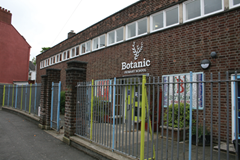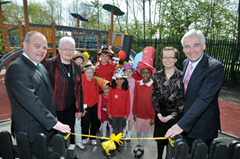Botanic Primary School
 Peter Cheney visits Botanic Primary School to find out how it educates a mix of local and foreign-born children.
Peter Cheney visits Botanic Primary School to find out how it educates a mix of local and foreign-born children.
South Belfast has long been known as a melting pot and today’s mix is very clear in one of its inner city primary schools. Botanic Primary’s 185 children come from 23 different nationalities and speak 21 languages. Fifty-five per cent of the enrolment is white and indigenous with 45 per cent coming from indigenous ethnic minority or foreign backgrounds.
A controlled school, it was established in 1939 and has always had children from overseas backgrounds, whose parents worked at Queen’s or in local hospitals.
agendaNi met principal Paul Bell, board of governors chair Hilary Sloan and teacher Vijay Tandon to learn more about life in a multi-cultural school; Mr Tandon is its Head of English as an Additional Language (EAL).
Botanic’s ethos is that children should “delight in effort, delight in achievementand delight in acceptance.” Mrs Sloan summed this up in one word: welcoming.
As with any school, its prime task is education but Mr Bell emphasised that it also wants to develop the child holistically. Not all children achieve high academic success so the school gives them opportunities to develop their musical and sporting skills.
It uses the nearby Queen’s University Physical Education Centre’s pitches and facilities. After-school clubs cover cookery, ICT, cycling proficiency and wall- climbing, again at the PEC.
Most primary schools have a steady intake of pupils who will be with them from P1 to P7. However, Botanic’s situation is more fluid e.g. with parents working in the university for two or three years. The staff sees this as an opportunity and each term, the whole school looks at one country.
Chinese history, culture and language, for example, have been studied and celebrated. The children and parents from that country contribute to that and the whole school learns from them.
Language
Last year, 91 children had English as an additional language. Their main mother tongues are Roma, Chinese and Lithuanian.
At the outset, Mr Tandon would interview a newcomer family with an interpreter if necessary.
“This is actually the start of the baseline assessment of the newcomer pupil because I will try to speak to some of the children that have no English or maybe have some English, just to ascertain the response,” he said.
In January, the school set up an ‘induction and intensive support class’ for pupils with no formal experience of education. It has 12-13 children, mostly Roma.
Children with no English at all need daily support and a structured EAL programme, beginning with survival language. From that point, it takes around two years to reach ‘social fluency’ but a child still needs to develop their reading and writing skills, and keep learning new words. Learning enough English for academic purposes takes five to seven years, and the work will continue at post-primary level.
Dual language books tell a story in both English and a foreign language. The mother tongue can therefore be used to learn English. These children slip back into their normal class in the afternoon for art, PE, ICT, music and sport. They are therefore encouraged to make friends within the wider school.
Staff recognise that Botanic is “somewhat individual,” Mr Bell related, but “that cannot ever be allowed to impinge on the fact that we want to provide high academic standards that a child can achieve so that each child can achieve their potential regardless of the circumstances.”
He commented: “Many schools provide a wide range of activities. In this school, I would argue that we’re one of the best in the opportunities that are provided but at the same time coupling that with academic achievement and development of the whole person.”
Mrs Sloan, a retired teacher, explained that when the new board was set up in 2009, it found that the increasing numbers of Roma children were challenging, particularly because of the language barrier. A class, for example, would have four or five children with no school background and no English.
“So we looked at this,” she remarked, “and we thought of an idea where we could possibly have some sort of induction class into which these newcomer children would go, irrespective of what age they are because they weren’t coming in the traditional route at P1. They were coming in at whatever age they were when they arrived in the country.”
The attendance of Roma children in the induction class is improving, from a very poor level, and the Education and Training Inspectorate has agreed to evaluate the group towards the end of term. That said, the school is currently paying for this work from its own funds.
 While Botanic is often highlighted for its ethnic minority children, Mr Bell stressed that the education of all its children is a priority. Each classroom has interactive whiteboards. A special needs co-ordinator works with local special needs children and foreign children who have attained a certain level of English.
While Botanic is often highlighted for its ethnic minority children, Mr Bell stressed that the education of all its children is a priority. Each classroom has interactive whiteboards. A special needs co-ordinator works with local special needs children and foreign children who have attained a certain level of English.
“It’s a very holistic approach, which is all developed and celebrated through having so many nationalities,” Mr Bell stated. “We’re obviously capitalising on that.”
Botanic’s parent teacher association is due to be named as the New PTA of the Year for Northern Ireland. Parents have also been surveyed and staff found the responses “very encouraging”.
The school received £10,000 from the Big Lottery Fund towards £25,000 of new playground equipment, which was opened in April. It has also invested in new classroom furniture and repainting the inside of the school building, to make it a “smart, attractive environment”.
Potential
The interviewees understandably did not want to get drawn into the contentious transfer debate. An academic route, they affirmed, suited some children but not others.
Mr Bell has seen it from both sides, as a parent and head teacher, and added: “All I can do is seek to meet the expectations of parents. We have, as a school, a primary objective which is that each child reaches their full potential.”
For an inner city school, it achieves “significant success” in transferring children to grammar school: 13 out of the 29 P7 children went to grammar school route last year. However, it is very difficult to explain Northern Ireland’s complex education system to newcomer parents.
Separately, local inner city families need to realise their child’s potential: “We would see children who we view as having a large degree of academic potential from the inner city that we know would be able to cope academically in a grammar school. And we have to almost suggest it to the parents.”
Essentially, Botanic sees itself as “a truly integrated school with a small i” in Mrs Sloan’s words. It has children from several different religions and teaches RE strictly within the limits of the core syllabus. Catholic children can leave slightly early in the school day for first communion classes.
“I don’t need to engage with another school because I have everything here. Any school trip I go on is an integrated education trip,” Mr Bell quipped. Asked for a message for policy-makers, he encouraged them to “start thinking beyond the two perceived traditions in Northern Ireland” when considering education.





